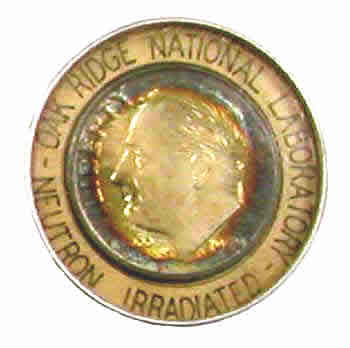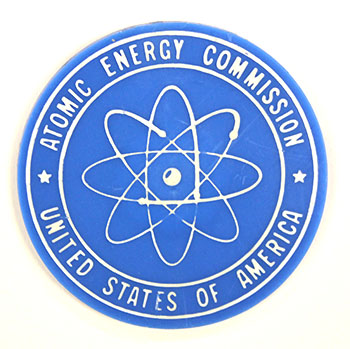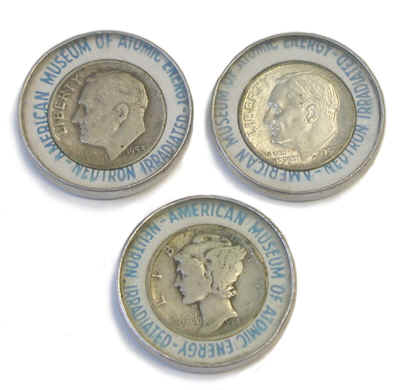
PREV ARTICLE
NEXT ARTICLE
FULL ISSUE
PREV FULL ISSUE
THE OAK RIDGE DIME IRRADIATORJoe Esposito writes:I came across this article recently while looking up information related to the Trinity explosion in New Mexico, which took place seventy-four years ago.
Thanks! It's from the site of Oak Ridge Associated Universities, home of the Oak Ridge reactor where souvenir irradiated dimes were produced. Here's an excerpt, but be sure to read the complete version online. -Editor
At the time that the dime irradiator was in operation, the Museum was managed by the Oak Ridge Institute for Nuclear Studies (ORINS). ORINS is now Oak Ridge Associated Universities (ORAU). In the late 1940s and/or early 1950s, dimes were irradiated at Oak Ridge National Laboratory (ORNL) and encased in a similar fashion (see photo below left). Encased dimes were also produced at atomic energy exhibits conducted at one or more Mid-South Fairs during the 1950s and early 1960s (see photo below right). At least one such fair was in Memphis.   The following description is from what I believe was a 1954 press release from the American Museum of Atomic Energy: "One of the most popular exhibits in the American Museum of Atomic Energy is a "dime irradiator." To date, more than 250,000 dimes have been irradiated, encased in plastic and returned to their owners as souvenirs. The irradiator works as follows: A mixture of radioactive antimony and beryllium is enclosed in a lead container. Gamma rays from the antimony are absorbed by the beryllium atoms and a neutron is expelled by the beryllium atom in the process. These neutrons, having no electrical charge, penetrate silver atoms in the dime. Instead of remaining normal silver-109, they become radioactive silver-110. After irradiation, the dime is dropped out through a slot in the lead container and rests momentarily before a Geiger tube so that its radioactivity may be demonstrated. It is then encased in the souvenir container. Radioactive silver, with a half-life of 22 seconds, decays rapidly to cadmium-110 (In 22 seconds, half of the radioactivity in each dime is gone, in another 22 seconds half the remainder goes, and so on until all the silver-110 has become cadmium). Only an exceedingly minute fraction of the silver atoms have been made radioactive." It seems that sometime in the 1960s, the museum and ORINS personnel decided to switch from the plutonium-beryllium neutron source to an americium-beryllium source. This required a trip to the Atomic Energy Commission (AEC) in Washington to secure approval and make the necessary arrangements. While the meeting was underway, Glenn Seaborg happened to drop in to see what was going on. Seaborg was both the discoverer of plutonium and the Chairman of the AEC, so when he made a casual comment to the effect that he assumed that they were using a plutonium source, any thought of an americium-beryllium source was scrubbed and the Oak Ridge contingent went back home. The solution was to increase the activity of the plutonium. I am not certain about the exact dates that the dime irradiator operated, but one report suggests that it was between 1949 and 1967. By then something like 1 million dimes had been irradiated. The end of the program was brought about in 1964 when they stopped using silver in U.S. coins, at least the small denomination coins. In 1965, they started making the dimes out of nickel clad copper. For a time, the Museum purchased rolls of dimes from the local banks and separated out the silver containing dimes in an effort to keep the program going. A dime irradiator occasionally took to the road. For example, one of these was set up at the 1964 World's Fair in New York. Visitors to the World's Fair exhibit who irradiated their dimes were given a blue plastic carrier with an atomic logo on it to hold them (photos below). Since the carriers were not sealed, there is no certainty that a dime they hold today had ever been irradiated.   At some point, the blue plastic holders were also used at the museum itself - see the images below. Perhaps the switch was made from the aluminium case sometime around 1964?   There is at least one other version of an irradiated dime (aluminum encased similar those at the top of the page) that is not in the ORAU collection. The text on it reads as follows: "ORNL - UCNC - Oak Ridge - Neutron Irradiated" (UCNC refers to Union Carbide Nuclear Company) I'm always excited to see articles from outside the numismatic community; these often provide original source material to document numismatic objects such as these encased dimes. This article does however reference a 1999 Coin World article by our own frequent contributor Mike Marotta, making it at least somewhat derivative. But I checked with Mike and he said his article was based on two visits to Oak Ridge, so this is likely quite accurate. -Editor To read the complete article, see:

Wayne Homren, Editor The Numismatic Bibliomania Society is a non-profit organization promoting numismatic literature. See our web site at coinbooks.org. To submit items for publication in The E-Sylum, write to the Editor at this address: whomren@gmail.com To subscribe go to: https://my.binhost.com/lists/listinfo/esylum All Rights Reserved. NBS Home Page Contact the NBS webmaster 
|
